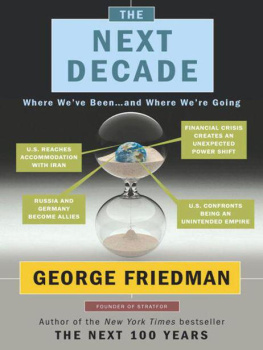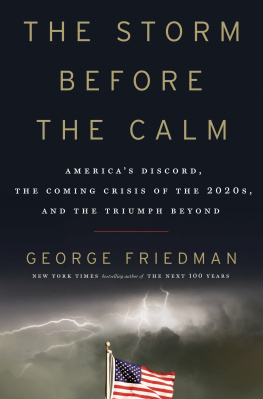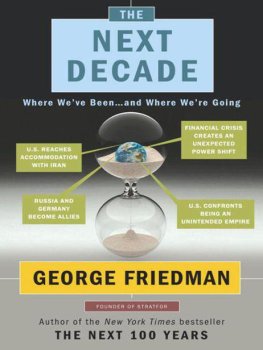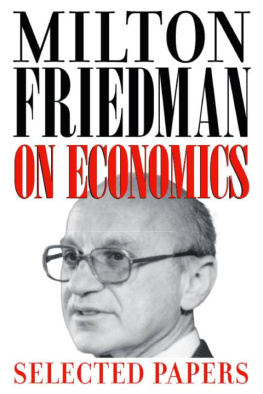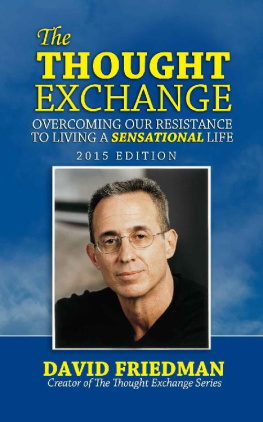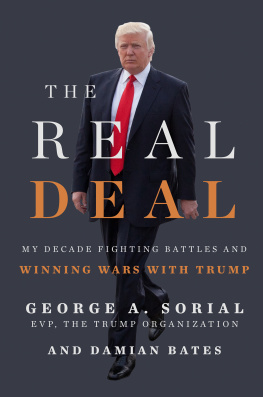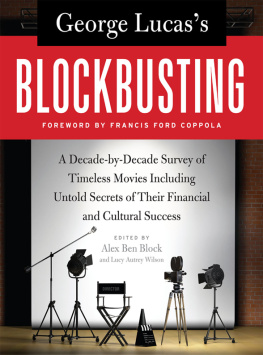George Friedman - The Next Decade: Where Weve Been . . . and Where Were Going
Here you can read online George Friedman - The Next Decade: Where Weve Been . . . and Where Were Going full text of the book (entire story) in english for free. Download pdf and epub, get meaning, cover and reviews about this ebook. year: 2011, publisher: Knopf Doubleday Publishing Group, genre: Politics. Description of the work, (preface) as well as reviews are available. Best literature library LitArk.com created for fans of good reading and offers a wide selection of genres:
Romance novel
Science fiction
Adventure
Detective
Science
History
Home and family
Prose
Art
Politics
Computer
Non-fiction
Religion
Business
Children
Humor
Choose a favorite category and find really read worthwhile books. Enjoy immersion in the world of imagination, feel the emotions of the characters or learn something new for yourself, make an fascinating discovery.
- Book:The Next Decade: Where Weve Been . . . and Where Were Going
- Author:
- Publisher:Knopf Doubleday Publishing Group
- Genre:
- Year:2011
- Rating:4 / 5
- Favourites:Add to favourites
- Your mark:
- 80
- 1
- 2
- 3
- 4
- 5
The Next Decade: Where Weve Been . . . and Where Were Going : summary, description and annotation
We offer to read an annotation, description, summary or preface (depends on what the author of the book "The Next Decade: Where Weve Been . . . and Where Were Going " wrote himself). If you haven't found the necessary information about the book — write in the comments, we will try to find it.
The Next Decade: Where Weve Been . . . and Where Were Going — read online for free the complete book (whole text) full work
Below is the text of the book, divided by pages. System saving the place of the last page read, allows you to conveniently read the book "The Next Decade: Where Weve Been . . . and Where Were Going " online for free, without having to search again every time where you left off. Put a bookmark, and you can go to the page where you finished reading at any time.
Font size:
Interval:
Bookmark:
THE NEXT 100 YEARS
AMERICAS SECRET WAR
THE FUTURE OF WAR
THE INTELLIGENCE EDGE
THE COMING WAR WITH JAPAN
POLITICAL PHILOSOPHY OF THE FRANKFURT SCHOOL


Copyright 2011 by George Friedman
All rights reserved. Published in the United States by Doubleday, a division of Random House, Inc., New York,
and in Canada by Random House of Canada, Limited, Tonronto.
www.doubleday.com
DOUBLEDAY and the DD colophon are registered trademarks of Random House, Inc.
All maps created by STRATFOR
Jacket design by Emily Mahon
Jacket photograph Chad Baker/Getty Images
Library of Congress Cataloging-in-Publication Data
Friedman, George.
The next decade / George Friedman.
p. cm.
1. World politics21st centuryForecasting. I. Title.
D863.F75 2011
909.831dc22 2010043116
eISBN: 978-0-385-53295-2
v3.1
For Don Kuykendall,
Friend
I hope to have God on my side, but I must have Kentucky.A BRAHAM L INCOLN Rules are not necessarily sacred, principles are.F RANKLIN R OOSEVELT We cannot play innocents abroad in a world that is not innocent.R ONALD R EAGAN It is necessary for a prince who wishes to maintain his position to learn how not to be good, and to use this knowledge or not to use it according to necessity.N ICCOL M ACHIAVELLI
CONTENTS
LIST OF ILLUSTRATIONS
AUTHORS NOTE
This book is about the relation among empire, republic, and the exercise of power in the next ten years. It is a more personal book than The Next 100 Years because I am addressing my greatest concern, which is that the power of the United States in the world will undermine the republic. I am not someone who shuns power. I understand that without power there can be no republic. But the question I raise is how the United States should behave in the world while exercising its power, and preserve the republic at the same time.
I invite readers to consider two themes. The first is the concept of the unintended empire. I argue that the United States has become an empire not because it intended to, but because history has worked out that way. The issue of whether the United States should be an empire is meaningless. It is an empire.
The second theme, therefore, is about managing the empire, and for me the most important question behind that is whether the republic can survive. The United States was founded against British imperialism. It is ironic, and in many ways appalling, that what the founders gave us now faces this dilemma. There might have been exits from this fate, but these exits were not likely. Nations become what they are through the constraints of history, and history has very little sentimentality when it comes to ideology or preferences. We are what we are.
It is not clear to me whether the republic can withstand the pressure of the empire, or whether America can survive a mismanaged empire. Put differently, can the management of an empire be made compatible with the requirements of a republic? This is genuinely unclear to me. I know the United States will be a powerful force in the world during this next decadeand for this next century, for that matterbut I dont know what sort of regime it will have.
I passionately favor a republic. Justice may not be what history cares about, but it is what I care about. I have spent a great deal of time thinking about the relationship between empire and republic, and the only conclusion I have reached is that if the republic is to survive, the single institution that can save it is the presidency. That is an odd thing to say, given that the presidency is in many ways the most imperial of our institutions (it is the single institution embodied by a single person). Yet at the same time it is the most democratic, as the presidency is the only office for which the people, as a whole, select a single, powerful leader.
In order to understand this office I look at three presidents who defined American greatness. The first is Abraham Lincoln, who saved the republic. The second is Franklin Roosevelt, who gave the United States the worlds oceans. The third is Ronald Reagan, who undermined the Soviet Union and set the stage for empire. Each of them was a profoundly moral man who was prepared to lie, violate the law, and betray principle in order to achieve those ends. They embodied the paradox of what I call the Machiavellian presidency, an institution that, at its best, reconciles duplicity and righteousness in order to redeem the promise of America.
I do not think being just is a simple thing, nor that power is simply the embodiment of good intentions. The theme of this book, applied to the regions of the world, is that justice comes from power, and power is only possible from a degree of ruthlessness most of us cant abide. The tragedy of political life is the conflict between the limit of good intentions and the necessity of power. At times this produces goodness. It did in the case of Lincoln, Roosevelt, and Reagan, but there is no assurance of this in the future. It requires greatness.
Geopolitics describes what happens to nations, but it says little about the kinds of regimes nations will have. I am convinced that unless we understand the nature of power, and master the art of ruling, we may not be able to choose the direction of our regime. Therefore, there is nothing contradictory in saying that the United States will dominate the next century yet may still lose the soul of its republic. I hope not, as I have children and now grandchildrenand I am not convinced that empire is worth the price of the republic. I am also certain that history does not care what I, or others, think.
This book, therefore, will look at the issues, opportunities, and inherent challenges of the next ten years. Surprise alliances will be formed, unexpected tensions will develop, and economic tides will rise and fall. Not surprisingly, how the United States (particularly the American president) approaches these events will guide the health, or deterioration, of the republic. An interesting decade lies ahead.
INTRODUCTION
R EBALANCING A MERICA
A century is about events. A decade is about people.
I wrote The Next 100 Years to explore the impersonal forces that shape history in the long run, but human beings dont live in the long run. We live in the much shorter span in which our lives are shaped not so much by vast historical trends but by the specific decisions of specific individuals.
This book is about the short run of the next ten years: the specific realities to be faced, the specific decisions to be made, and the likely consequences of those decisions. Most people think that the longer the time frame, the more unpredictable the future. I take the opposite view. Individual actions are the hardest thing to predict. In the course of a century, so many individual decisions are made that no single one of them is ever critical. Each decision is lost in the torrent of judgments that make up a century. But in the shorter time frame of a decade, individual decisions made by individual people, particularly those with political power, can matter enormously. What I wrote in The Next 100 Years is the frame for understanding this decade. But it is only the frame.
Font size:
Interval:
Bookmark:
Similar books «The Next Decade: Where Weve Been . . . and Where Were Going »
Look at similar books to The Next Decade: Where Weve Been . . . and Where Were Going . We have selected literature similar in name and meaning in the hope of providing readers with more options to find new, interesting, not yet read works.
Discussion, reviews of the book The Next Decade: Where Weve Been . . . and Where Were Going and just readers' own opinions. Leave your comments, write what you think about the work, its meaning or the main characters. Specify what exactly you liked and what you didn't like, and why you think so.

